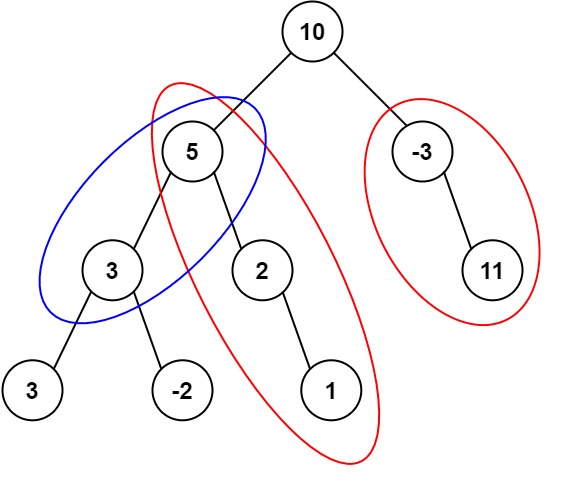Path Sum III
Given the root of a binary tree and an integer targetSum, return the number of paths where the sum of the values along the path equals targetSum.
The path does not need to start or end at the root or a leaf, but it must go downwards (i.e., traveling only from parent nodes to child nodes).
Example 1:

Input: root = [10,5,-3,3,2,null,11,3,-2,null,1], targetSum = 8
Output: 3
Explanation: The paths that sum to 8 are shown.
Example 2:
Input: root = [5,4,8,11,null,13,4,7,2,null,null,5,1], targetSum = 22
Output: 3
Constraints:
The number of nodes in the tree is in the range [0, 1000].
-109 <= Node.val <= 109
-1000 <= targetSum <= 1000
/**
* Definition for a binary tree node.
* public class TreeNode {
* int val;
* TreeNode left;
* TreeNode right;
* TreeNode() {}
* TreeNode(int val) { this.val = val; }
* TreeNode(int val, TreeNode left, TreeNode right) {
* this.val = val;
* this.left = left;
* this.right = right;
* }
* }
*/
class Solution {
public int pathSum(TreeNode root, int targetSum) {
if (root == null) return 0;
// Count all paths starting from current root
int fromRoot = countFromNode(root, targetSum);
// Recursively try left and right subtrees
int fromLeft = pathSum(root.left, targetSum);
int fromRight = pathSum(root.right, targetSum);
// Debug: show which node is being processed
// System.out.println("Node: " + root.val + ", fromRoot: " + fromRoot + ", fromLeft: " + fromLeft + ", fromRight: " + fromRight);
return fromRoot + fromLeft + fromRight;
}
// Helper method to count paths starting from a specific node
private int countFromNode(TreeNode node, long sum) {
if (node == null) return 0;
int count = 0;
// If current node itself completes the sum
if (node.val == sum) count++;
// Try extending the path to the left and right children
count += countFromNode(node.left, sum - node.val);
count += countFromNode(node.right, sum - node.val);
return count;
}
}
Comments
Post a Comment